When you go abroad, please keep your roots in mind, and don’t let fear stop you from speaking out.
The education you received at Pao School has enabled you to become a citizen of the world,
with a responsibility to act as a representative of China. You have been giving the
confidence needed to act as a cultural messenger, alongside values of compassion,
integrity and balance, which can be used to influence and inspire others.
—— Philip Sohmen
Executive Deputy Chairman,
speaking to graduates at the 2020 Graduation Ceremony
After a challenging year for all, many Pao School alumni have found themselves unexpectedly studying from China. However, this hasn’t dissuaded the industrious Pao School cohort, as they have found ways to make the best of the situation. From creating businesses, to taking part in internships to finding artistic outlets, the alumni are forging their own paths in an ever-changing world and becoming powerful ambassadors from China to the world.
Here are the stories of two of our graduates:
Andy, Class of 2019
School of Visual Arts in New York City, Illustration
Pao School is a really great place, and it gave me the chance to become a true artist. They are not limiting students, they didn’t limit my ideas, my understanding of art. Pao School accepted my ideas, my artistic expression. That’s very important to an artist because once you are limiting the artists' ideas and their thoughts about art, they are not going to be a great artist.
—— Andy
In October 2020, Andy participated in the Art Plus Shanghai International Fair, showing a number of different artworks to the general public. The exhibition saw 15,000 attendees over a four-day period visit around 80 different galleries. He was the youngest artist at the Fair, which was both his first professional exhibition and an opportunity to stand alongside experienced artists as a peer.
Traditionally, college students would be unable to participate in such an exhibition as it is usually reserved for more mature, experienced artists. However, travel restrictions related to the pandemic opened up the opportunity, with many of the Fair’s international artists unable to attend. And so, Andy leapt at the chance to show his work for the first time.
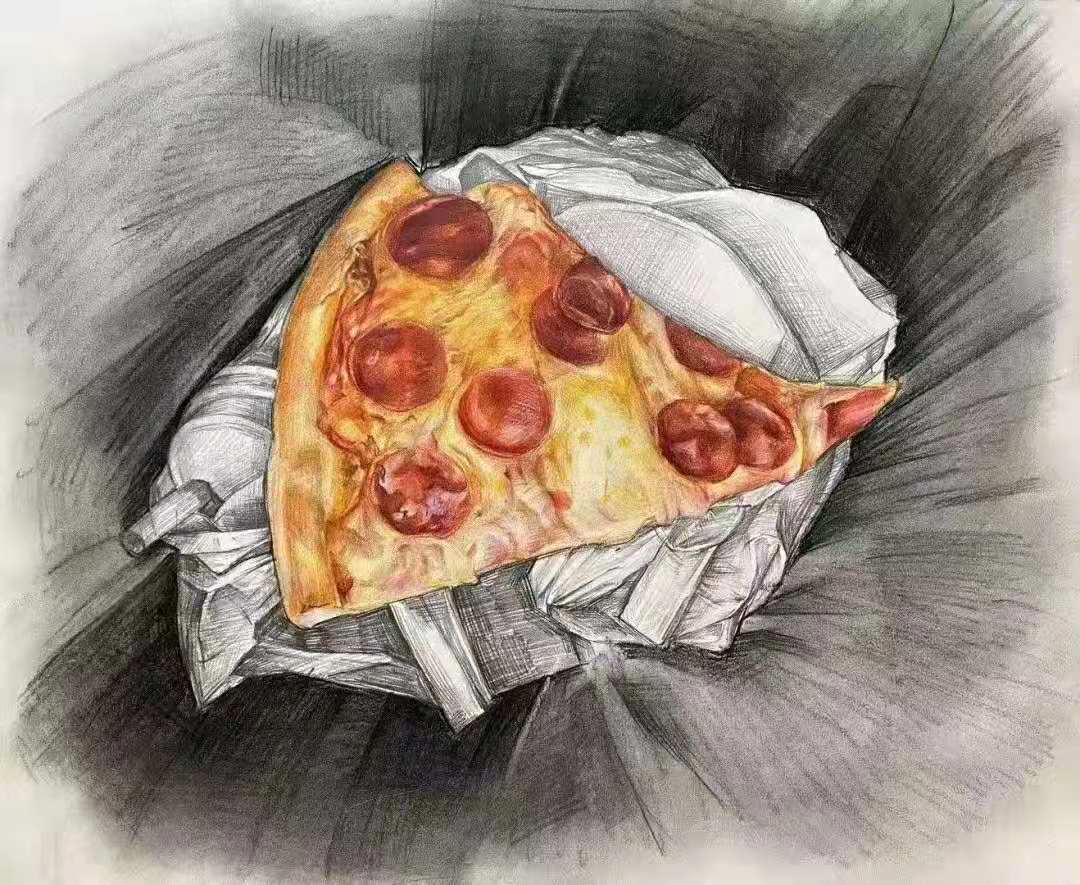
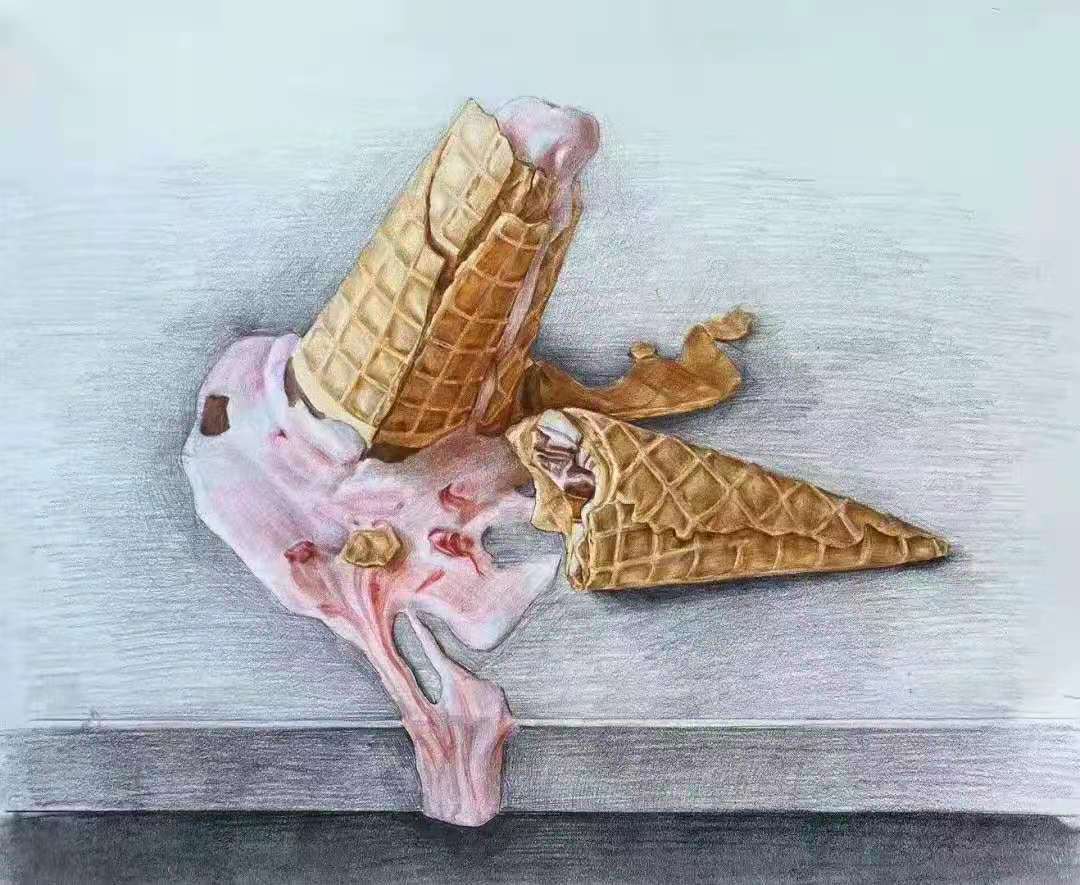
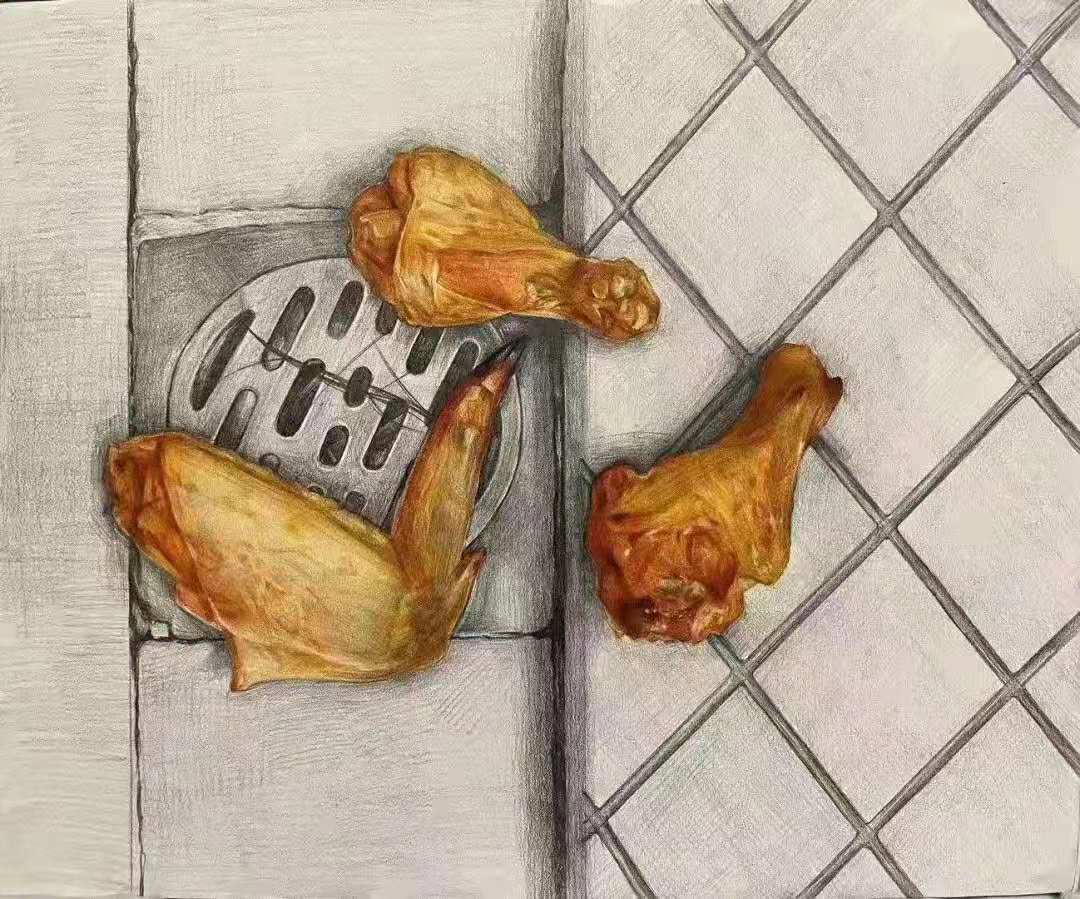
Andy's painting about food wastage
At first, the lack of experience was nerve-racking, as Andy was worried that nobody would enjoy or understand his pieces. Previously, he had only shown his work at the Pao School graduate exhibition for IB art students and didn’t know what to expect. He shouldn't have worried as his work even went on to sell.
“It was a huge exhibition, with thousands of people in the audience, so I was very worried. But, when I actually saw people step into my section and stand in front of my artworks for a long time, taking pictures, I felt very encouraged. It made me much more confident in my artwork and my future artmaking.” Andy says.

Andy and his IB Art teacher Mrs.Jones
In part, Andy believes this success was due to his chosen style – a combination of classic and modern art. He describes his pieces as a method of communication, a way to express ideas to an audience with both the clarity of meaning through clear imagery, but also a level of ambiguity and room for interpretation.
He also believes that young people enjoy his work due to its contemporary nature and relatability. During the exhibition, he displayed a series of self-portraits made earlier in the year that described his feelings towards living in New York during the pandemic. The pieces show his isolation and longing to return home, feelings that deeply resounded with much of the audience. The topic in itself particularly stood out, “I didn’t see anyone else making art about the pandemic at the exhibition – I think I was the only one. It got people interested.”
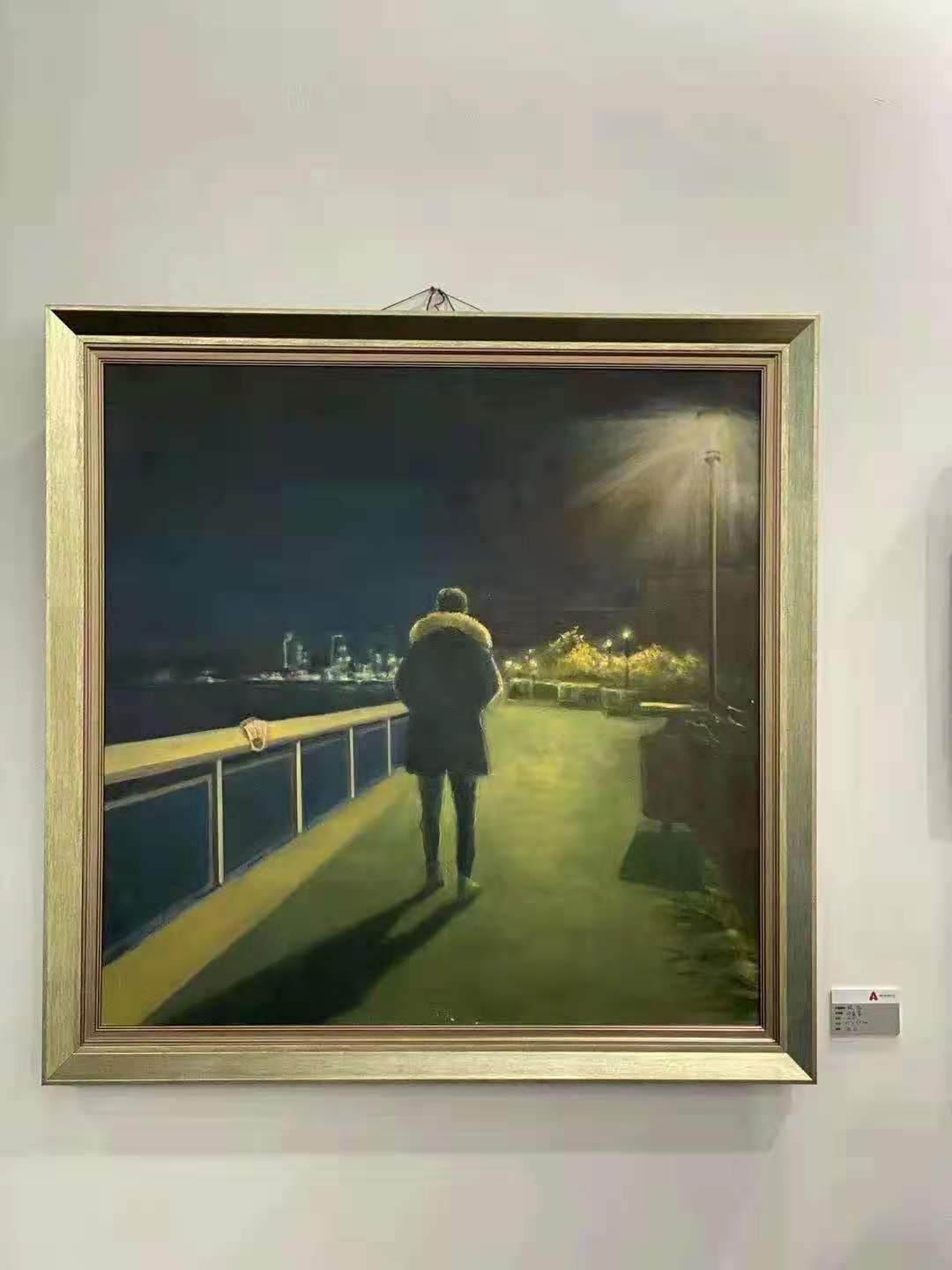
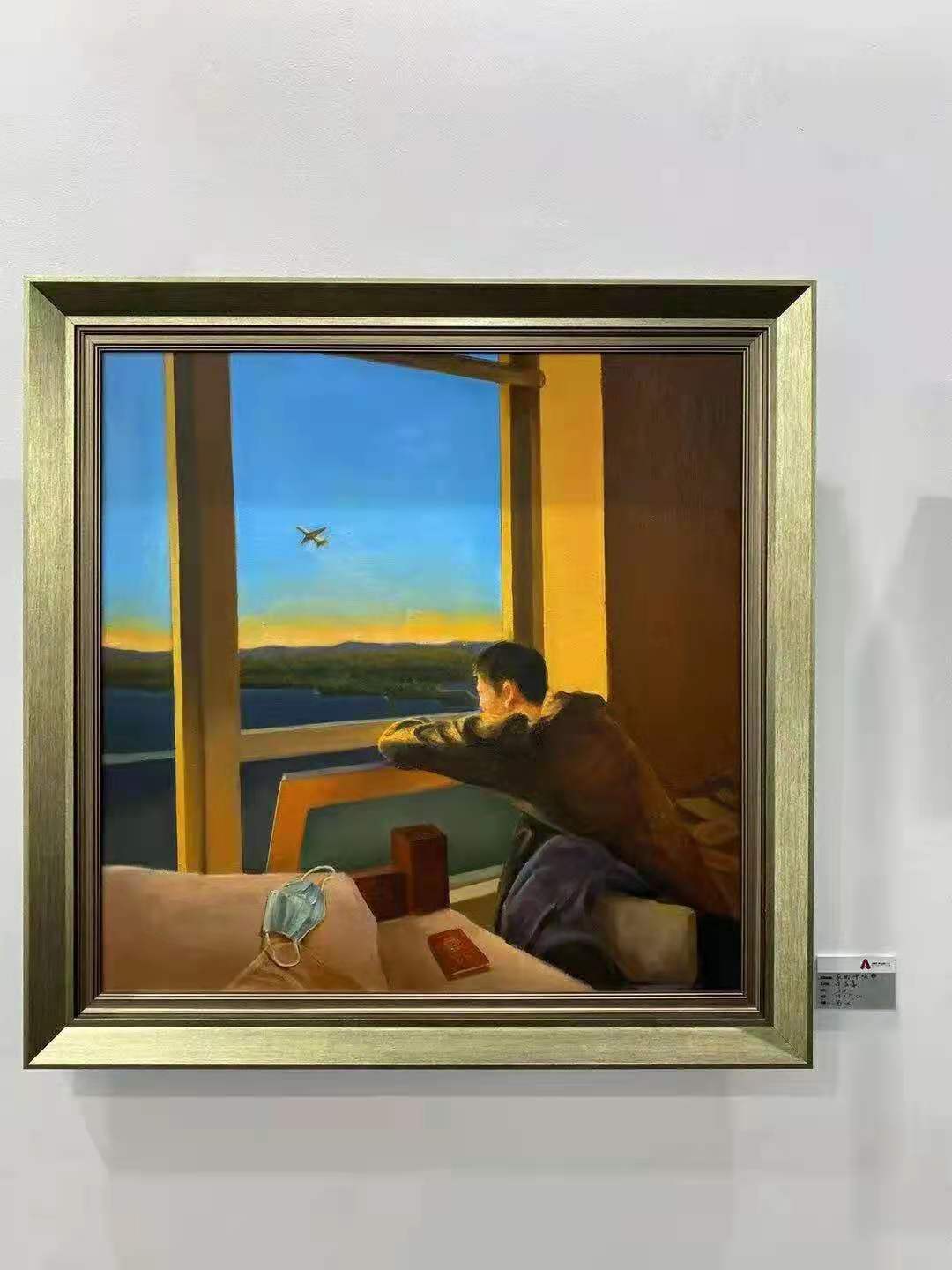
Andy's painting about the pandemic
Andy’s third collection at the Fair was a series of pencil works depicting various foods. He had created the pieces to consider the way food is wasted and abandoned outside. He explains that the younger audience was interested in methods he had used to illustrate the food and that food is a topic that is naturally attractive.
As the youngest artist showing his work at the exhibition, Andy used the experience to learn from more mature exhibitors. In particular, he was interested in what artwork was popular and what attracted people to certain artworks, as he is curious about the relationship between artist and audience. “I asked the other artists if they were worried if the majority of audiences couldn’t understand their work and aren’t interested in their work. And they said to just be myself and to express what I want to express in my artwork… they told me to be less concerned about the audience, to be more focused on myself.”
Speaking with the others also allowed him to get expert feedback on his pieces and technique, Andy realized that his ideas are interesting, but his artistic technique could be improved. However, he also feels that his youth and inexperience, which can sometimes limit his practical skills, was at times a benefit compared to other artists. It allows him to produce work he feels is more relatable to young people, from his own perspective, and integrate more ‘modern ideas’ into his work.
Becoming a ‘true artist’ at Pao School
Andy’s path to becoming an artist seems almost predetermined. His love of art influenced his choice to transfer to Pao School in Year 6. He was intrigued by the school’s dedication to ‘Whole Person Education’, “I started doing art when I was three years old, I loved doing art at Primary School and I didn’t want to abandon it. So, I wanted to find a school that was going to make my art better.”
This determination saw him pass through IGCSE and IB Art, laying the foundation for the artist he is today. During his school days, Andy became familiar with his teachers outside of the classroom, often going to the studio over the weekend to apply the art skills he had learned during IB class. Under the influence of Mrs. Jones, his IB Art teacher, Andy became more developed as an artist. Previously he had been making art directly from a photo or set scene, copying what he saw, or, as he describes, ‘making a photo by painting.’ Mrs. Jones encouraged him to become more focused on making his own art.
“I learned the true meaning of art, how to be a true artist and be more expressive in my artworks. I wasn’t stuck in photos and still life, but instead, I started to involve more of my own ideas and my own understanding in the artwork.” Andy says.
At first this was difficult, though after years of practise and producing many pieces, he is becoming more familiar with creating more abstract work. Andy remembers a story of a piece he created in IB class, a portrait of himself tired and exhausted. He describes how he would usually collect reference materials to copy, but was stopped by Mrs. Jones, who – as Andy recalls - said, “I had to have more of my own ideas, own understanding and to change, to make it less like a photo and more like a painting.” In the end, he followed this advice, using purple and blue to make the portrait less lively and more exhausted, with exaggerated features to convey lethargy in the piece.
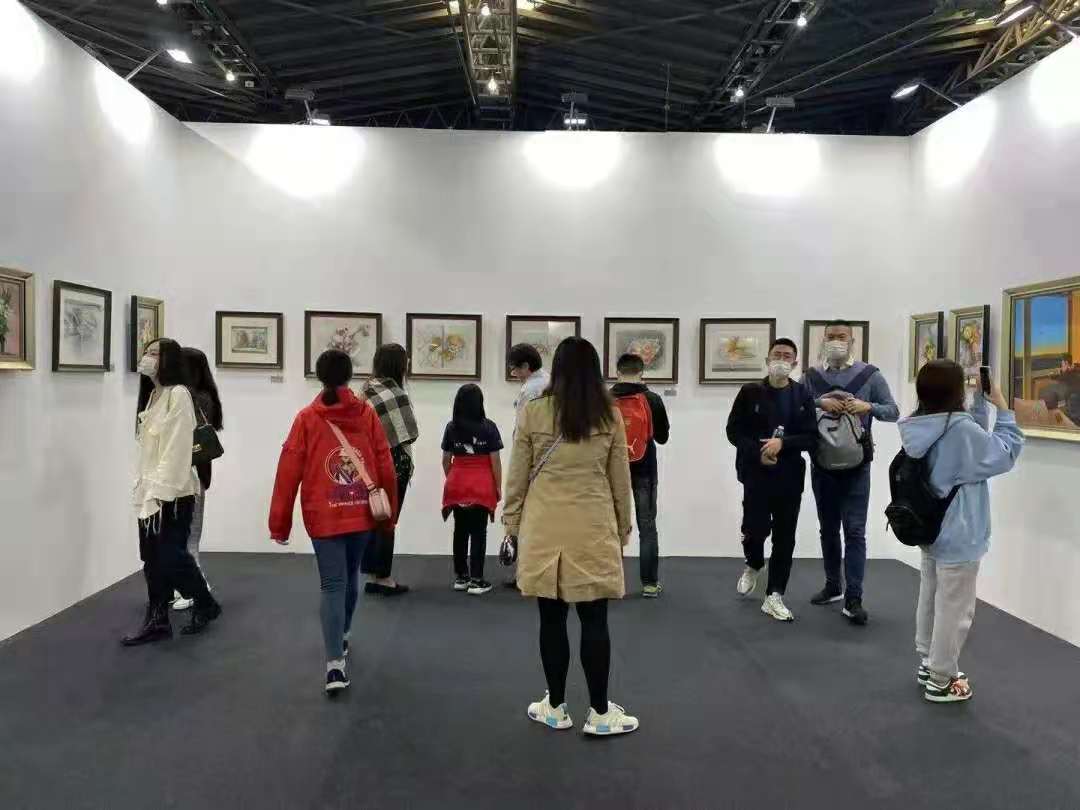
Fair attendess viewing Andy's work
Sat in front of a laptop, making paintings...
Due to the pandemic, Andy is spending his sophomore year of college in Shanghai, studying online and creating artwork from home. This presents certain challenges, as his college professors are unable to guide him as closely as they would be if he was in the classroom. Andy explains that this is a challenge because the professors are usually there to watch him from those early sketches to the final product, making comments along the way, however now they cannot give such intricate guidance.
But with the bad comes the good, this transition to online teaching has encouraged Andy to learn new art skills – as he is able to choose whether to make art digitally or by hand. He opted to learn how to make digital art, despite having little experience in the medium, explaining that though he was terrible at first, he sees improvement with each new piece of art. His choice was both practical, as he didn’t have space to buy all new art supplies for his home, and forward-thinking, “I believe it is what future illustrators will do, make digital paintings. I think that’s the future of art.”
Alongside the future of art, Andy is considering where his own future will lie. His studies in illustration open up many doors for him as an artist and he is considering illustrating video games or posters for movies. However, for now, he is focused on developing his skills and creating art.
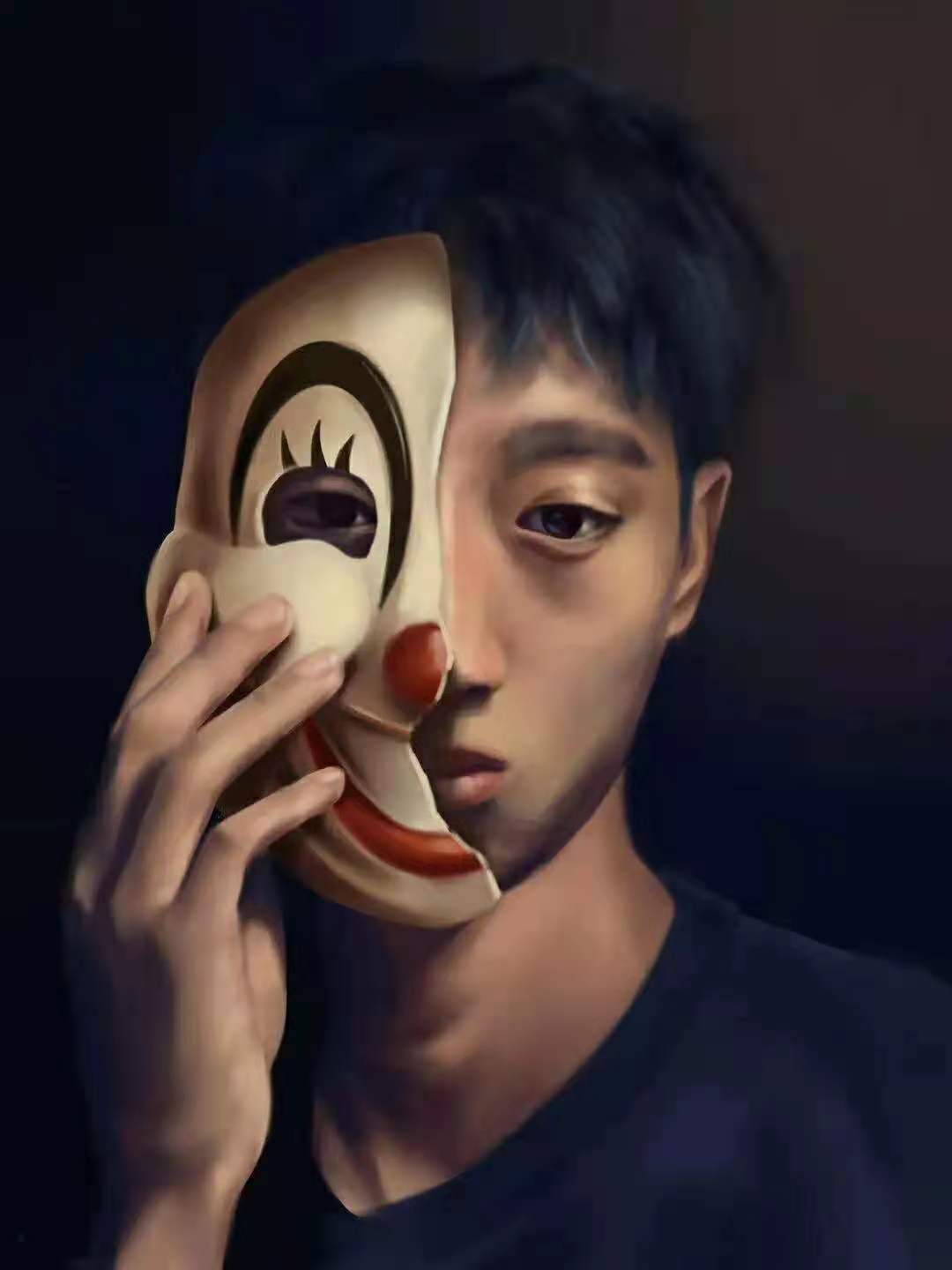
Andy's Digital Artwork
Clementine, Class of '17
Columbia University, Political Science and Economics
You are never too young or too old for anything. Everyone I know is doing amazing things. For me, it’s just that I want to be active and contribute and create value. It’s really about what I can chew off at this point in my life, and I always strive to do my best.”
—— Clementine
As a member of the first graduating class of YK Pao School, Clementine grew alongside the High School campus and was an early architect of the school’s identity. With the help of the teachers and her peers, she founded the first Student Government, Pao Weekly - the school’s first student newspaper, and Pao School’s first debate club.
“The school then was a very formative environment, a place with endless possibilities, so we were able to fill in the blanks ourselves, and to really think about what we want to see happen here.” Clementine explains. The spirit of the first graduating class lives on in the many traditions and clubs they started, which have continued to flourish after their graduation and have become inseparable parts of the Pao School community.
To Clementine, one of the most impactful experiences in Pao School was hosting China’s first ever Lincoln-Douglas Debate Competition. Lincoln-Douglas is a type of one-on-one value debate that requires a deep understanding of classical and philosophical literature. The debate is challenging for high schoolers in general, especially for those who speak English as their second language. However, Clementine, an experienced debater, was excited to take on the challenge. She felt this format matched Pao School’s emphasis on whole-person education, and thus wanted to host the first Lincoln-Douglas competition in China with other members of the debate club. She emailed a proposal to all the school leaders, contacted numerous schools, and invited many debate coaches to come and support the event. And, after seeing her emails and enthusiasm, the school generously supported her work by providing a budget and a venue for the tournament.
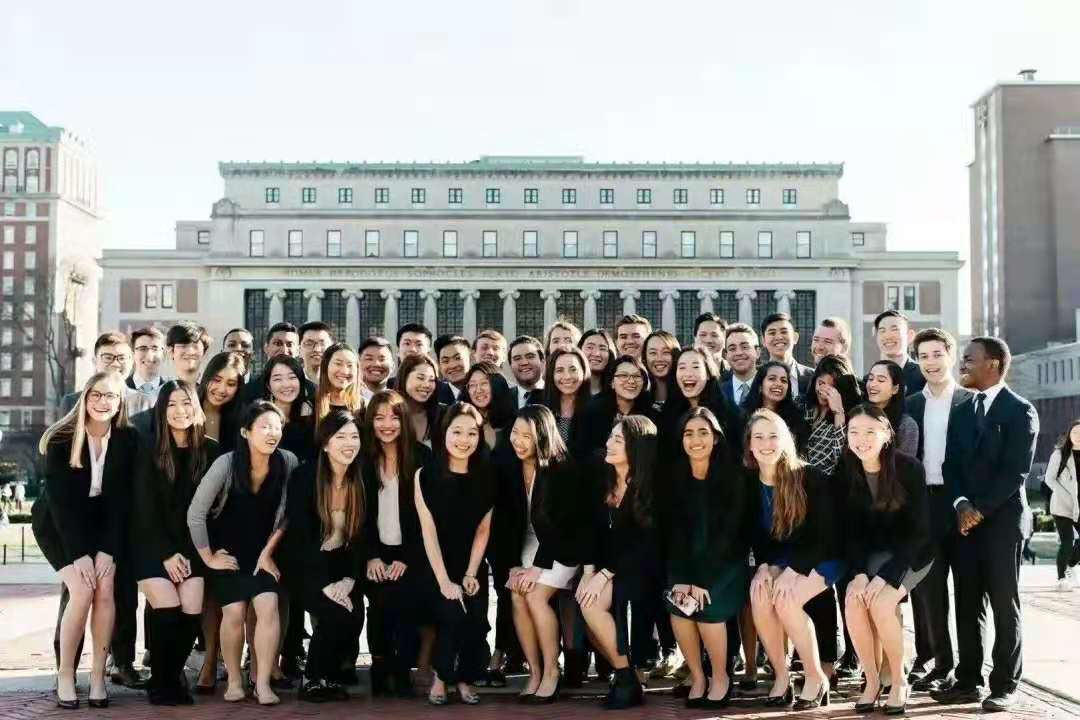
Clementine with her business fraternity at Columbia
“I was only 15-years-old and really trying to bite off something more than I could chew…” Clementine reflects, “Seeing teams from all around Asia coming to this tournament, debate judges showing up for free, and Pao School supporting me along the way, has really convinced me to constantly step out of my comfort zone. It taught me that as long as I have enough faith in a good idea and willing to push it, there will always be people who will respond to that and help me.”
Since graduating from Pao School, Clementine has carried this mentality with her and maintained the spirit of creating and executing new ideas. She is a natural pioneer, and over the past few years has started many new endeavours, including the impressive task of founding her own investment fund.
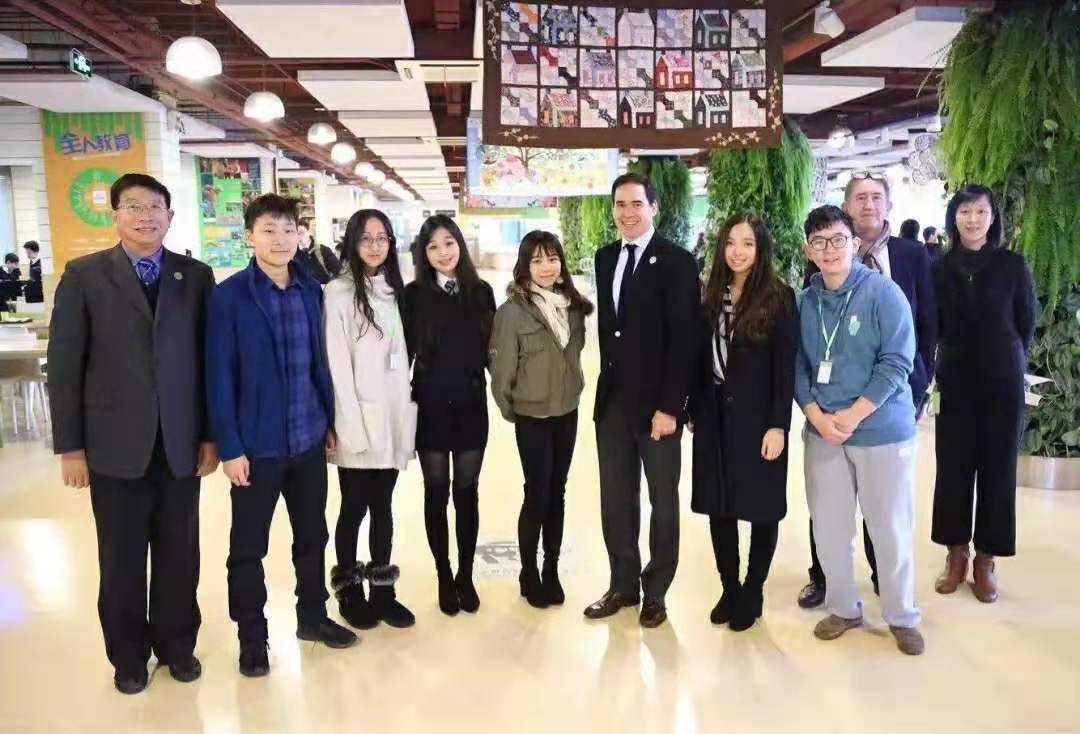
Creating a legacy at Columbia University
When she first joined Columbia, Clementine was amazed by the vast resources: Nobel prize laureate professors who are always open for a conversation, bustling cutting-edge labs, and awesome students from different countries and backgrounds. At Columbia, going to classes and getting good grades is simply not enough – students stretch themselves. Or, as Clementine says in her own words, “University is a multifaceted experience. The more you want and try to do, the more you can get out of it. You really need to juice everything out of the college experience.”
After being part of various clubs and societies during her first year, Clementine realized she wanted to create something by herself at Columbia: an investment fund. She describes herself as an “explore-by-doing” kind of person. She felt the traditional recruitment path of the finance industry didn’t suit her personality and wanted to dive into the industry under her own terms. Longing for hands-on experience while still in college, she embraced the idea of raising and operating a solid portfolio, rather than joining groups focused on theoretical skill development.
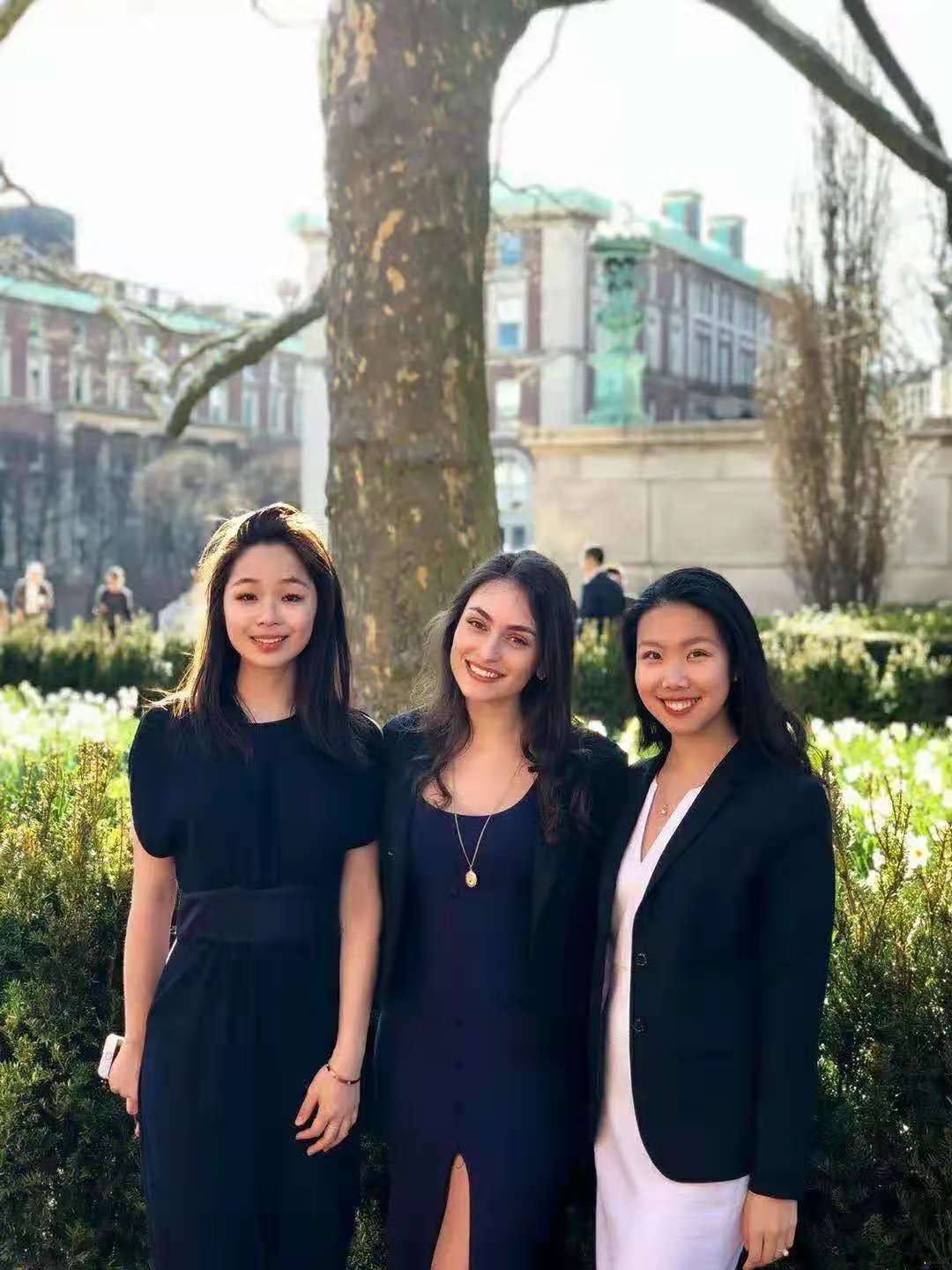
Despite having little finance experience initially, she successfully launched her first fund at Columbia by doing numerous pitch presentations, attracting other Columbia students, designing a training curriculum, consulting people senior in the finance industry, hosting pitch competitions, and trying relentlessly.
After a few years of experience in finance, Clementine has gradually gravitated towards venture capital as she realized she is more excited by funding innovative ideas versus simply pursuing monetary gains through technical financial models.
As the COVID-19 pandemic has swept the world, Clementine has gone on a gap year to try and transform the investment fund into a full-time venture. In addition to finance, she is also working on a few cultural and social projects with friends – including a non-profit think tank which aims to tackle misconceptions about China overseas through providing authentic and accurate English language materials about the country.